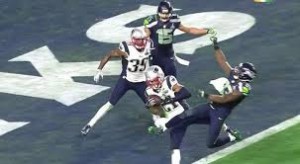Good Decisions, Bad Outcomes

Bad Decision or Bad Outcome?
The New England Patriots won the Super Bowl because their opponents, the Seattle Seahawks, made a bad decision. That’s what millions of sports fans in the United States believe this week.
But was it a bad decision or merely a bad outcome? We often evaluate whether a decision was good or bad based on the result. But Ronald Howard, the father of decision analysis, says that you need to separate the two. You can only judge whether a decision was good or bad by studying how the decision was made.
Howard writes that the outcome has nothing to do with the quality of the decision process. A good decision can yield a good result or a bad result. Similarly, a bad decision can generate a good or bad outcome. Don’t assume that the decision causes the result. It’s not so simple. Something entirely random or unforeseen can turn a good decision into a bad result or vice versa.
But, as my boss used to say, we only care about results. So why bother to study the decision process? We should study only what counts – the result of the process, not the process itself.
Well, … not so fast. Let’s say we make a decision based entirely on emotion and gut feel. Let’s also assume that things turn out just great. Did we make a good decision? Maybe. Or maybe we just got lucky.
During the penny stock market boom in Denver, I decided to invest $500 in a wildcat oil company whose stock was selling for ten cents a share. In two weeks, the stock tripled to 31 cents per share. I had turned my $500 stake into $1,500. I was a genius! (There’s a touch of confirmation bias here).
What’s wrong with this story? I assumed that I had made a good decision because I got a good outcome. I must be smart. But, really, I was just lucky. And you probably know the rest of the story. Assuming that I was a smart stock picker, I re-invested the $1,500 and – over the next six months – lost it all.
Today, when I evaluate stocks with the aim of buying something, I repeat a little mantra: “I am not a genius. I am not a genius.” It creates a much better decision process.
I was lucky and got a good outcome from a bad decision process. The Seattle Seahawks, on the other hand, got the opposite. From what I’ve read, they had a good process and made a good decision. They got a horrendous result. Even though their fans will vilify the Seahawks’ coaches, I wouldn’t change their decision process.
And that’s the point here. If you want good decisions, study the decision process and ignore the outcome. You’ll get better processes and better decisions. In the long run, that will tilt the odds in your favor. Chance favors the thoughtful decision maker.
What makes for a good decision process? I’ll write more about that in the coming weeks. In the meantime, you might like two video clips from Roch Pararye, a professor at the University of Pennsylvania, who explains why we separate decision processes from decision results. (Click here and here).
Arguments and Sunk Costs

Why would I ever argue with her?
Let’s say that Suellen and I have an argument about something that happened yesterday. And, let’s say that I actually win the argument. (This is highly theoretical).
The Greek philosophers who invented rhetoric classified arguments according to the tenses of the verbs used. Arguments in the past tense are about blame; we’re seeking to identify the guilty party. Arguments in the present tense are about values – we’re debating your values against mine. (These are often known as religious arguments). Arguments in the future tense are about choices and actions; we can decide something and take action on it. (Click here for more detail).
In our hypothetical situation, Suellen and I argue about something in the past. The purpose of the argument is to assign blame. I win the argument, so Suellen must be to blame. She’s at fault.
I win the argument so, bully for me. Since I’ve won, clearly I’m not to blame. I’m not the one at fault. I’m innocent. Maybe I do a little victory dance.
Let’s look at it from Suellen’s perspective. She lost the argument and, therefore, has to accept the blame. How does she feel? Probably not great. She may be annoyed or irritated. Or she might feel humiliated and ashamed. If I try to rub it in, she might get angry or even vengeful.
Now, Suellen is the woman I love … so why would I want her to feel that way? If someone else made her feel annoyed, humiliated, or angry, I would be very upset. I would seek to right the wrong. So why would I do it myself?
Winning an argument with someone I love means that I’ve won on a small scale but lost on a larger scale. I’ve come to realize that arguing in the past tense is useless. Winning one round simply initiates the next round. We can blame each other forever. What’s the point?
In the corporate world, the analogue to arguing in the past tense is known as sunk costs. Any good management textbook will tell you to ignore sunk costs when making a decision. Sunk costs are just that – they’re sunk. You can’t recover them. You can’t redeem them. You can’t do anything with them. Therefore, they should have no influence on the future.
Despite the warnings, we often factor sunk costs into our decisions. We don’t want to lose the money or time that we’ve already invested. And, as Roch Parayre points out in this video, corporations often create perverse incentives that lead us to make bad decisions about sunk costs.
Our decisions are about the future. Sunk costs and arguments about blame are about the past. As we’ve learned over and over again, past performance does not guarantee future results. We can’t change the past; we can change the future. So let’s argue less about the past and more about the future. When it comes to blame or sunk costs, the answer is simple: Don’t cry over spilt milk. Don’t argue about it either.
Gaming the Tripwire

We need to make a decision.
When you make a decision, you create a certain amount of inertia. Let’s say your company decides to pursue Option X. Just by making the decision, you’ve created a vested interest group – people who benefit from continued investment in Option X. They will lobby for Option X even if turns out to be a bad decision. They may also lobby against review processes that could reverse the decision.
To ensure that you review decisions adequately, Chip and Dan Heath recommend the use of tripwires. The tripwire sets conditions that require you to review your decision.
David Lee Roth, lead singer of Van Halen, used a particularly ingenious tripwire to determine if a venue had fulfilled its contractual obligations. As the Heaths point out, Van Halen’s “production design was astonishingly complex.” Lots of things could go wrong and, if they did, band members might be injured. Given the complexity, how could the band quickly tell if all the contractual obligations had been fulfilled?
Roth came up with a simple solution: in the midst of a complicated contract, Roth inserted a demand: a large bowl of M&Ms would be on hand with all the brown M&Ms removed. This was Van Halen’s tripwire. If the bowl of M&Ms was properly prepared, the band knew that the local managers had read the contract closely and had (most likely) done everything right. On the other hand, if a brown M&M appeared … well, it was time to throw a fit and double check everything. A brown M&M indicated that a critical decision needed to be made – should the show go on?
Tripwires are good ideas but they can be gamed. At my college, for instance, all male students had to take two years of military science (ROTC). We marched around in uniforms and learned the proper care and feeding of an M1 rifle.
Every month, officers from the local base inspected us. They paid particular attention to the cleanliness of our rifles. There was one part of the rifle – just below the barrel – that was especially hard to clean. We noticed that the officers always focused on that part of the rifle. If it was clean, they assumed that the rest of the rifle was also clean; there was no need to look further. It was a tripwire.
As soon as we cadets realized this, we cleaned only that part of the rifle. In fact, we had contests to see how dirty we could make the rest of the rifle without being found out. We learned that we could pass inspection with filthy rifles as long as that one small section was clean. We delighted in fooling our officers.
Tripwires are great ideas. They remind you that all decisions are temporary and need to be reviewed from time to time. They set conditions that trigger such reviews. But they’re not foolproof. If the people who support the decision figure out the tripwire, they may well try to game it. It’s up to you to figure out how the game works.